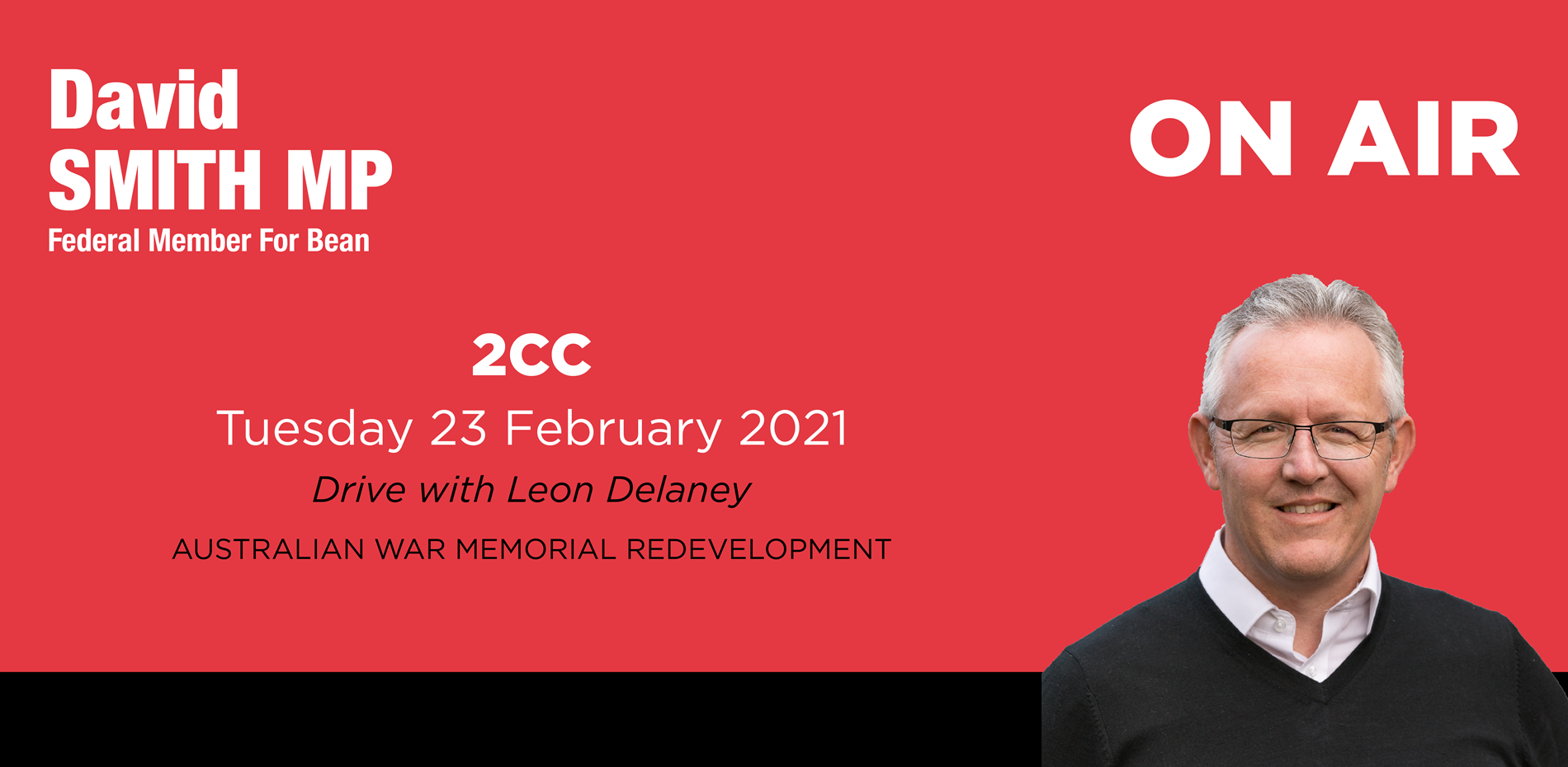Radio Interview - Drive 2CC Canberra - 23 February 2021

23 February 2021
E&OE TRANSCRIPT
RADIO INTERVIEW
2CC CANBERRA DRIVE
TUESDAY, 23 FEBRUARY 2021
SUBJECT: Australian War Memorial redevelopment.
LEON DELANEY, HOST: A parliamentary committee has recommended that the Australian War Memorial's redevelopment should go ahead. However, Labor has asked for other options to be considered. The current half a billion dollar proposal requires the destruction of Anzac Hall built less than 20 years ago. And we've discussed this many times before and it remains extremely controversial. Federal Member for Bean, David Smith. Good afternoon.
DAVID SMITH MP, MEMBER FOR BEAN: Good afternoon, Leon. How are you?
DELANEY: Very well, thanks---thanks for joining us today. Now, you're the dissenting voice here. I believe you'd like to save Anzac Hall.
SMITH: So both Tony Zappia and I expressed a dissenting view. We recognise that there's certainly a need for refurbishment of the memorial, there are issues around disability access and a need for additional space. But we could see that there was a pathway to doing that with still preserving Anzac Hall and also possibly at the same time looking at using the Treloar Centre out at Mitchell, making that available more often to constituents.
DELANEY: Yeah, there's a lot of people have expressed concern, including some former directors of the War Memorial. There's been architects groups that have been expressing concern, heritage groups expressing concern, all centred around the loss of Anzac Hall. There were alternative proposals put forward. Why was the big ambitious and expensive proposal the one adopted?
SMITH: I think there are different arguments about what the need for space was and certainly one of the arguments that is ongoing is about how you represent conflicts that may not be that well represented currently at the War Memorial. Part of the debate is well do they actually all need major pieces of equipment to be moved to the War Memorial? Or could you actually do that in a better way as the Imperial War Museum seems to in the UK, as the Space and Air Museum does in in Washington. So make use of two sites rather than continuously look at the one site.
DELANEY: Some people have expressed concern that the scale and the nature of this redevelopment risks turning the memorial into more of a theme park tourist attraction and less of a reflective memorial site. Do you share those concerns?
SMITH: It's a really tricky balance and the balance is always meant to be that combination of memorial, museum and archive. I think the intentions of the War Memorial staff are still to preserve that critical memorial function. But you can imagine because of the scale of some of the changes that you can understand why people were concerned.
DELANEY: And half a billion dollars is absolutely [a] large amount of money, particularly considering other national institutions struggle to get funding. Of course, there are those who have suggested that the money would be better spent actually helping veterans, particularly with their mental health issues.
SMITH: I don't think it necessarily needs to be an either or, so we should be actually funding support for our veterans regardless and we should be ensuring that we actually properly resource the rest of our national institutions. That said, one of the key remits for the Public Works Committee is to ensure that we do actually get value for money for taxpayers. One of the views certainly that Tony Zappia and I came to was that you may be able to actually save a significant amount of money if you did actually preserve Anzac Hall and possibly looking at using the Treloar Centre over in Mitchell instead.
DELANEY: And while you are keen on that idea, obviously you're not the one making the final call, are you?
SMITH: Correct and we respect the majority position of the committee. We think that there's still capacity within the boundaries of the Public Works decision to possibly revisit some of those elements---but at the same time, we respect the way all the participants were involved in the inquiry, both those for and against particular approaches to redevelopment. So we thought it was critical to ensure that our views were recorded.
DELANEY: Thanks very much for joining us today.
SMITH: Thanks, Leon.
DELANEY: David Smith, the Federal Member for Bean.
ENDS.


